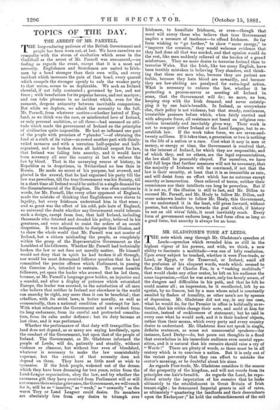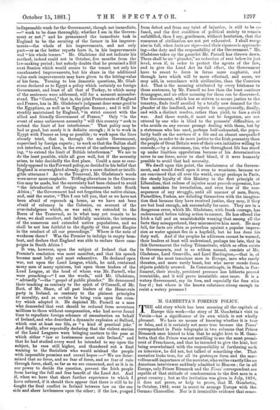MR. GLADSTONE'S TONE AT LEEDS.
THE note which rang through Mr. Gladstone's speeches at Leeds—speeches which revealed him as still in the highest vigour of his powers, and with, we think, a new ability to fascinate a multitude—was one of lofty resolution. Upon every subject he touched, whether it were Free-trade, or Land, or Egypt, or the Transvaal, or Ireland, amid all the profusion of his eloquent words, words which seemed to flow, like those of Charles Fox, in a "rushing multitude that would choke any other orator, he left on his audience the same impression,—that he was aware, only too keenly aware, of the dangers and difficulties in his path, and that he felt he could master all ; an impression, be it recollected, left by no egotist, by no Gascon, but by a man whose mind is constantly assailed by flashes of humility, as other men's are by spasms. of depression. Mr. Gladstone did not say, in any one case, what he would do, for the Premier in office is habitually so re- ticent, that his critics change their note, and scold at him for caution, instead of recklessness of statement; but he said in every case what he would seek, and it is their leaders' objects,, rather than their means, which every party and every country desire to understand. Mr. Gladstone does not speak in single, definite sentences, as some not unsuccessful speakers—for instance, Lord Derby—do, but pours out thoughts in a flood that overwhelms in his immediate audience even mental oppo- sition, and it is natural that his enemies should raise a cry of "Words !" There are plenty of words, as there must be in all oratory which is to convince a nation. But it is only out of the veriest perversity that they can affect to mistake the orator's meaning, or be doubtful about his aims.
As regards Free-trade, Mr. Gladstone considers it the source of the prosperity of the kingdom, and will not recede from its principles one hair's-breadth. As regards the Land, he repu- diated utterly the imputation of his enemies that he looks ultimately to the establishment in Great Britain of Irish tenant-right ; he denounced Imperial grants in aid of rates, as ultimately "quartering the landlords and their descendants upon the Exchequer ;" he held the enfranchisement of the soil
indispensable work for the Government, though not immediate, —" work to be done thoroughly, whether I am in the Govern- ment or not ;" and he pronounced the immediate task in England to be the securing of the farmer in his improve- ments—the whole of his improvements, and not only part—or as the better reports have it, in his improvements and "his whole tenure." Mr. Gladstone did not indicate his method, indeed could not in October, five months from the law-making period ; but nobody doubts that he promised a Bill next Session which would secure to the tenant not only his unexhausted improvements, but his share in the additional value such improvements may have given to the letting-value of his farm. Turning to less domestic questions, Mr. Glad- stone declared as to Egypt a policy which certainly no foreign Government, and least of all that of Turkey, to which many of the sentences were addressed, will for a moment misunder- stand. The "Control," that is, the joint Protectorate of England and France, has in Mr. Gladstone's judgment done some good to the Egyptians, as well as to Egyptian finance ; and it will be steadily maintained by England, "in strict concert with the allied and friendly Government of France." Only "in the event of some unforeseen necessity" will this country " seek to extend the limit of her interference." That policy may be bad or good, but surely it is definite enough ; it is to work in Egypt with France as long as possible ; to work upon the lines already tried, that is, through the native Government, supervised by foreign experts ; to work so that the Sultan shall not interfere, and then, in the event of the unforeseen happen- ing, "to extend the limit of British interference." We are to do the least possible, while all goes well, but if the necessity arises, to take decidedly the first place. Could a man so reso- lutely opposed to theForward policy, so decided in his belief that England is overweighted already, give a more distinct or intelli-
gible utterance As to the Transvaal, Mr. Gladstone's words were never more emphatic. Trifling alterations in the Conven- tion may be made, but the suzerainty had been claimed to avoid "the introduction of foreign embarrassments into South Africa ; " the Government had not forgotten the native claims, and, said the orator, "This I can tell you, that as we have not been afraid of reproach 4 home, as we have not been afraid of calumny in the Colonies, on account of the over-indulgence which, as was said, we extended to the Boers of the Transvaal, so in what may yet remain to be done, we shall recollect, and faithfully maintain, the interests of the numerous and extended native populations, and we shall be not less faithful to the dignity of this great Empire in the conduct of all our proceedings." Where is the note of weakness there ? Was the Premier to indulge in empty bom- bast, and declare that England was able to endure three cam- paigns in South Africa ?
It was, however, upon the subject of Ireland that the Premier's resolution was most manifest, and that his speech became most lofty and most exhaustive. He declared open war, not upon the Land League, which, he said, contained many men of many opinions, but upon those leaders of the Land League, at the head of whom was Mr. Parnell, who were preaching—" I use the words," said Mr. Gladstone, "advisedly "—the "gospel of public plunder." He denounced their teaching as contrary to the spirit of O'Connell, of Mr. Butt, of Mr. Shaw, of all past leaders of the Home-rule party in Ireland, as contrary to the plainest principles of morality, and as certain to bring ruin upon the coun- try which adopted it. He depicted Mr. Parnell as a man who demanded that rent should be reduced from seventeen millions to three without compensation, who had never found time to repudiate foreign schemes of assassination on behalf of Ireland, and who described a dynamite explosion at Salford, which cost at least one life, as "a kind of practical joke." And finally, after repeatedly declaring that the violent section of the Land Leaguers were bringing matters to the pass at which either "law or lawlessness must rule Ireland," and that he had studied every word he intended to say upon the subject, he rose still higher, and thundered out a final warning to the Socialists who would mislead the people with impossible promises and unreal hopes :—" We are deter- mined that no force, and no fear of force, and no fear of ruin through force, shall, so far as we are concerned, and as it is in our power to decide the question, prevent the Irish people from having the full and free benefit of the Land Act. And if, when we have that short further experience to which I have referred, if it should then appear that there is still to be fought the final conflict in Ireland between law on the one side and sheer lawlessness upon the other; if the law, purged from defect and from any taint of injustice, is still to be re- fused, and the first condition of political society to remain unfulfilled, then I say, gentlemen, without hesitation, that the resources of civilisation are not yet exhausted. I shall recog- nise in full, when facts are ripe—and their ripeness is approach- ing—the duty and the responsibility of the Government." Mr.. Gladstone takes up the gauntlet Mr. Parnell has thrown down. There shall be no " plunder,"no reduction of rent below its just level, even if, in order to protect the agents of the law, and to give the Land Act its full effect, the Government have to resort to force in forms more emphatic, and through laws which will be more effectual, and more, we may add, in accordance with civilisation, than the Coercion Act. That is the meaning attributed by every Irishman to those sentences, by Mr. Parnell no less than the least cautious. demagogue, and no other meaning for them can be discovered. The Government, which has so striven to secure justice to the tenantry, finds itself assailed by a totally new demand for the plunder of the landlord, and rejects it unequivocally, finally, and with a distinct resolve, rather than yield, to face a civil war. And these words, it must not be forgotten, are not uttered by one who is blind to the peasants' difficulties, or who avoids on any excuse prompt dealing with them, but by a statesman who has used, perhaps half-exhausted, the popu- larity built on the services of a life and an almost unequalled majority, in order to do more justice to the Irish peasantry than the people of Great Britain were of their own initiative willing to concede,—by a statesman, too, who throughout life has stood up under limitless opprobrium because of his determination never to use force, never to shed blood, if it were humanly possible to avoid that bad necessity.
We dwell upon this point, the resoluteness of the Govern- ment, and would dwell upon it even to weariness, because we are convinced that all over the world, except perhaps in Paris, the steady loyalty of this Ministry to the first principle of Liberalism, that redress of injuries must precede repression, has. been mistaken for irresolution, and even fear of the con- sequences of any struggle, until all manner of men, Boers,. Parnellites, Pashas, are deluding themselves with the imagina- tion that because they have received justice, they may, if they are but loud enough, ask successfully for more. They are in a. dangerous error, which Mr. Gladstone, with frank courage, has endeavoured before taking action to correct. He has offered the- Irish a full and an unmistakable warning that among all the facts they misapprehend, they misconceive him most. He may fail, for facts are often as powerless against a popular impres- sion as water against fire in a hayfield, but he has done his. duty welL And if the peoples he addresses cannot be warned, their leaders at least will understand, perhaps too late, that in this Government the ruling Triumvirate, which so often exists. in Governments, and is so seldom named, consists of Mr. Gladstone, Lord Granville, and Lord Hartington,—that is, of three of the most tenacious men in Europe, men who rarely threaten, and more rarely boast, but who never recede from- objects publicly avowed. In Constantinople, in Simla, in Par- liament, their steady, persistent pressure has hitherto proved irresistible, and it will prove irresistible once more. It is a watery Government, say its foes, and especially the foes who fear it ; but where is the known substance strong enough to resist a watery pressure ?



































 Previous page
Previous page